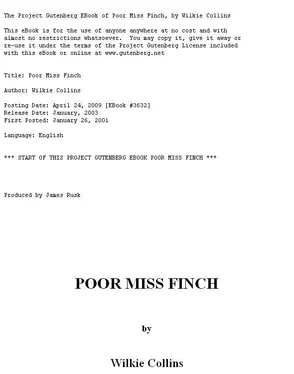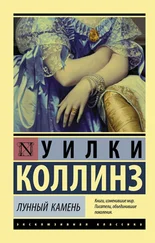Уилки Коллинз - Poor Miss Finch
Здесь есть возможность читать онлайн «Уилки Коллинз - Poor Miss Finch» весь текст электронной книги совершенно бесплатно (целиком полную версию без сокращений). В некоторых случаях можно слушать аудио, скачать через торрент в формате fb2 и присутствует краткое содержание. Год выпуска: 2002, Жанр: Классическая проза, на английском языке. Описание произведения, (предисловие) а так же отзывы посетителей доступны на портале библиотеки ЛибКат.
- Название:Poor Miss Finch
- Автор:
- Жанр:
- Год:2002
- ISBN:нет данных
- Рейтинг книги:3 / 5. Голосов: 1
-
Избранное:Добавить в избранное
- Отзывы:
-
Ваша оценка:
- 60
- 1
- 2
- 3
- 4
- 5
Poor Miss Finch: краткое содержание, описание и аннотация
Предлагаем к чтению аннотацию, описание, краткое содержание или предисловие (зависит от того, что написал сам автор книги «Poor Miss Finch»). Если вы не нашли необходимую информацию о книге — напишите в комментариях, мы постараемся отыскать её.
Poor Miss Finch — читать онлайн бесплатно полную книгу (весь текст) целиком
Ниже представлен текст книги, разбитый по страницам. Система сохранения места последней прочитанной страницы, позволяет с удобством читать онлайн бесплатно книгу «Poor Miss Finch», без необходимости каждый раз заново искать на чём Вы остановились. Поставьте закладку, и сможете в любой момент перейти на страницу, на которой закончили чтение.
Интервал:
Закладка:
My aunt addressed herself to me in her grandest manner.
"You will understand, Lucilla, that it is impossible for me to notice such language as this in any other way than by leaving the room. If you can bring Mr. Grosse to his senses, inform him that I will receive his apologies and explanations in writing." Pronouncing these lofty words with her severest emphasis, Miss Batchford rose another inch, and sailed majestically out of the room.
Grosse took no notice of the offended lady: he only put his hands in his pockets, and looked out of window once more. As the door closed, Oscar left the corner in which he had seated himself, not over-graciously, when we entered the room.
"Am I wanted here?" he asked.
Grosse was on the point of answering the question even less amiably than it had been put—when I stopped him by a look. "I want to speak to you," I whispered in his ear. He nodded, and, turning sharply to Oscar, put this question to him:
"Are you living in the house?"
"I am staying at the hotel at the corner."
"Go to the hotel, and wait there till I come to you."
Greatly to my surprise, Oscar submitted to be treated in this peremptory manner. He took his leave of me silently, and left the room. Grosse drew a chair close to mine, and sat down by me in a comforting confidential fatherly way.
"Now my goot-girls," he said. "What have you been fretting yourself about since I was last in this house? Open it all, if you please, to Papa Grosse. Come begin-begin!"
I suppose he had exhausted his ill-temper on my aunt and Oscar. He said those words—more than kindly—almost tenderly. His fierce eyes seemed to soften behind his spectacles; he took my hand and patted it to encourage me.
There are some things written in these pages of mine which it was, of course, impossible for me to confide to him. With those necessary reservations—and without entering on the painful subject of my altered relations with Madame Pratolungo—I owned quite frankly how sadly changed I felt myself to be towards Oscar, and how much less happy I was with him, in consequence of the change. "I am not ill as you suppose," I explained. "I am only disappointed in myself, and a little downhearted when I think of the future." Having opened it to him in this way, I thought it time to put the question which I had determined to ask when I next saw him.
"The restoration of my sight," I said, "has made a new being of me. In gaining the sense of seeing, have I lost the sense of feeling which I had when I was blind? I want to know if it will come back when I have got used to the novelty of my position? I want to know if I shall ever enjoy Oscar's society again, as I used to enjoy it in the old days before you cured me—the happy days, Papa-Grosse, when I was an object of pity, and when all the people spoke of me as Poor Mrs. Finch?"
I had more to say—but at this place, Grosse (without meaning it, I am sure) suddenly stopped me. To my amazement, he let go of my hand, and turned his face away sharply, as if he resented my looking at him. His big head sank on his breast. He lifted his great hairy hands, shook them mournfully, and let them fall on his knees. This strange behavior and the still stranger silence which accompanied it, made me so uneasy that I insisted on his explaining himself. "What is the matter with you?" I said. "Why don't you answer me?"
He roused himself with a start, and put his arm round me, with a wonderful gentleness for a man who was so rough at other times.
"It is nothing, my pretty lofe," he said. "I am out of sort, as you call it. Your English climates sometimes gives your English blue devil to foreign mens like me. I have got him now—an English blue devil in a German inside. Soh! I shall go and walk him out, and come back empty-cheerful, and see you again." He rose, after this curious explanation, and attempted some sort of answer—a very odd one—to the question which I had asked of him. "As to that odder thing," he went on, "yes-indeed-yes. You have hit your nail on his head. It is, as you say, your seeings which has got in the way of your feelings. When your seeings-feelings has got used to one anodder, your seeings will stay where he is, your feelings will come back to where they was; one will balance the odder; you will feel as you did; you will see as you didn't; all at the same times, all jolly-nice again as before. You have my opinions. Now let me walk out my blue devil. I swear to come back again with a new inside. By-bye-my-Feench-good-bye."
Saying all this in a violent hurry, as if he was eager to get away, he gave me a kiss on the forehead, snatched up his shabby hat, and ran out of the room.
What did it mean?
Does he persist in thinking me seriously ill? I am too weary to puzzle my brains in the effort to understand my dear old surgeon. It is one o'clock in the morning; and I have still to write the story of all that happened later in the day. My eyes are beginning to ache; and, strange to say, I have hardly been able to see the last two or three lines I have written. They look as if the ink was fading from them. If Grosse knew what I am about at this moment! His last words to me, when he went back to his patients in London, were:—"No more readings! no more writings till I come again!" It is all very well to talk in that way. I have got so used to my Journal that I can't do without it. Nevertheless, I must stop now—for the best of reasons. Though I have got three lighted candles on my table, I really cannot see to write any more.
To bed! to bed!
[Note.—I have purposely abstained from interrupting Lucilla's Journal until my extracts from it had reached this place. Here the writer pauses, and gives me a chance; and here there are matters that must be mentioned, of which she had personally no knowledge at the time.
You have seen how her faithful instinct still tries to reveal to my poor darling the cruel deception that is being practiced on her—and still tries in vain. In spite of herself, she shrinks from the man who is tempting her to go away with him—though he pleads in the character of her betrothed husband. In spite of herself, she detects the weak places in the case which Nugent has made out against me—the absence of sufficient motive for the conduct of which he accuses me, and the utter improbability of my plotting and intriguing (without anything to gain by it) to make her marry the man who was not the man of her choice. She feels these hesitations and difficulties. But what they really signify it is morally impossible for her to guess.
Thus far, no doubt, her strange and touching position has been plainly revealed to you. But can I feel quite so sure that you understand how seriously she has been affected by the anxiety, disappointment, and suspense which have combined together to torture her at this critical interval in her life?
I doubt it, for the sufficient reason that you have only had her Journal to enlighten you, and that her Journal shows she does not understand it herself. As things are, it seems to be time for me to step on the stage, and to discover to you plainly what her surgeon really thought of her, by telling you what passed between Grosse and Nugent, when the German presented himself at the hotel.
I am writing now (as a matter of course) from information given to me, at an after-period, by the persons themselves. As to particulars, the accounts vary. As to results, they both agree.
The discovery that Nugent was at Ramsgate necessarily took Grosse by surprise. With his previous knowledge, however, of the situation of affairs at Dimchurch, he could be at no loss to understand in what character Nugent had presented himself to Lucilla; and he could certainly not fail to understand—after what he had seen and what she had herself told him—that the deception was, under present circumstances, producing the worst possible effect on her mind. Arriving at this conclusion, he was not a man to hesitate about the duty that lay before him. When he entered the room at the hotel in which Nugent was waiting, he announced the object of his visit in these four plain words, as follows:
Читать дальшеИнтервал:
Закладка:
Похожие книги на «Poor Miss Finch»
Представляем Вашему вниманию похожие книги на «Poor Miss Finch» списком для выбора. Мы отобрали схожую по названию и смыслу литературу в надежде предоставить читателям больше вариантов отыскать новые, интересные, ещё непрочитанные произведения.
Обсуждение, отзывы о книге «Poor Miss Finch» и просто собственные мнения читателей. Оставьте ваши комментарии, напишите, что Вы думаете о произведении, его смысле или главных героях. Укажите что конкретно понравилось, а что нет, и почему Вы так считаете.






